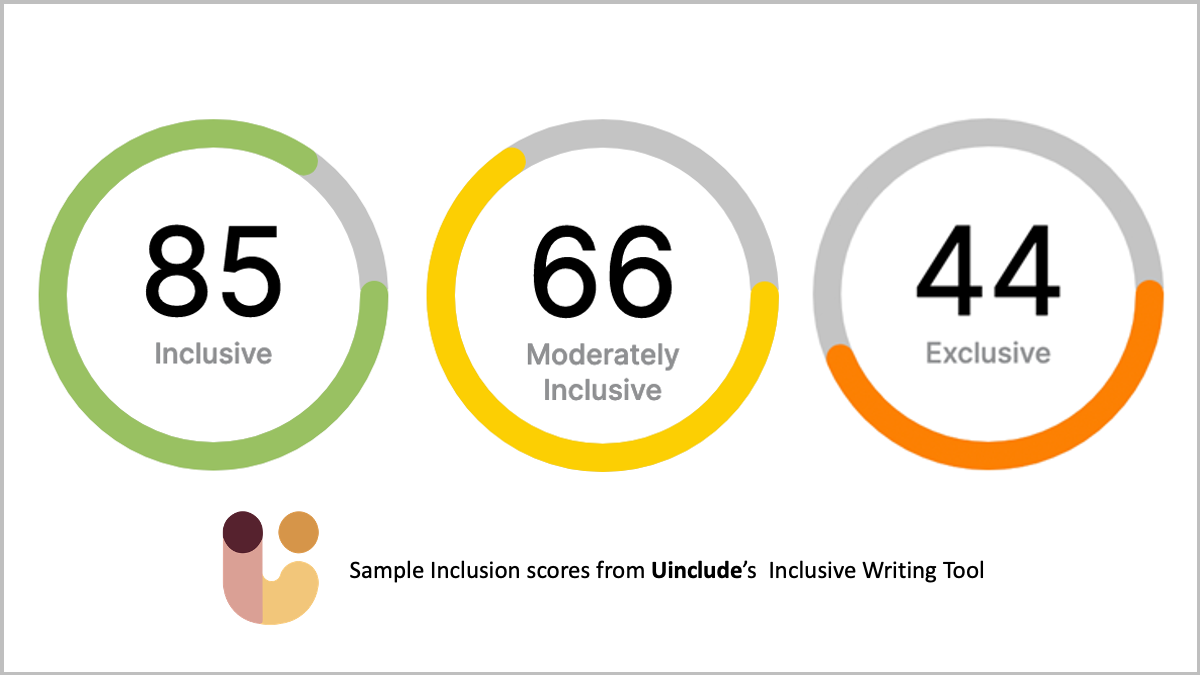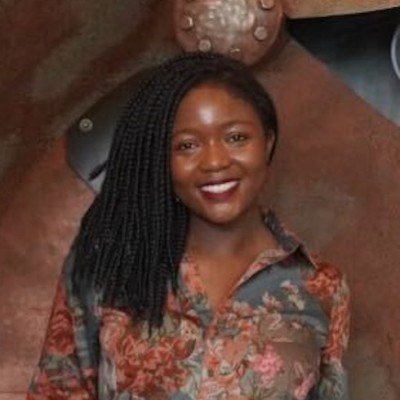UInclude: Creating a more inclusive workplace, one job description at a time
We interview Toshe Ayo-Ariyo, co-founder of UInclude, about their new Inclusive Writing Tool to make recruiting material more inclusive.
Rachel Whaley: Tell us about UInclude and how you got started. What’s unique about your approach?
Toshe: UInclude is a Los Angeles-based company whose products establish equity in the recruitment process and increase workplace diversity. Our core product, the UInclude Inclusive Writing Tool, identifies language in recruitment material that is biased against various marginalized groups and provides employers with suggestions on how to make their material more inclusive.
Currently, our tool addresses gender and racial bias and as we expand, our products will address biases against more underrepresented groups. The corporate representation of some historically excluded communities (e.g. people with disabilities, religious minorities, immigrants, etc.) is also significantly lacking. Yet they are rarely included in conversations around diversity and inclusion. My co-founders and I are a team of women of color who each have a range of identities that shape our experiences and worldview, so it’s really important for us to make sure that we’re also keeping communities with less visibility at the center of the work that we do.
This Inclusive Writing Tool uses algorithms to create inclusive and unbiased job descriptions proven to attract more diverse candidates
UInclude is unique in its focus on addressing subtle language that is subconsciously deterring for underrepresented individuals. We go beyond the obvious, outdated and incorrect language that many products and online resources reference (e.g. the recommendation to not use “Negro” when referring to Black people), and identify the subtle and insidious language the subconsciously has psychological impacts on those communities and how they respond to job ads. Our most recent research study on race-based inclusive and exclusive language explores the ways in which the subtle language used in job ads impact both BIPOC and non-BIPOC individuals’ decision to apply for a role.
In job descriptions, the top 5 feminine coded words account for 60% of all feminine coded words in the dataset, while the top 5 masculine coded words account for only 30% of all masculine coded words.
Rachel: A key part of our mission at LA Tech4Good is to strengthen the “tech for good” ecosystem in Los Angeles and beyond. How do you envision UInclude fitting into that ecosystem?
Toshe: LA is definitely becoming a tech hub in the U.S. We’re really thankful to be in this space and to benefit from the resources that exist because of the growing tech ecosystem here. What’s unique about starting a mission-driven company with a focus on diversity and inclusion in a city like LA is the fact that the city’s demographics reflect those of the communities we aim to serve (i.e. the underrepresented groups whose representation we strive to increase in the workplace). Ironically, many companies that have a presence in the city, some of which are our existing users, struggle to ensure that their companies reflect the demographic makeup of LA. We are positioning ourselves as the premier tech solution for equitable hiring in LA so that companies can use our product to hire more underrepresented candidates. This is especially important as LA’s tech hub continues to grow and as both major players and growing tech companies build roots here. Having a diverse set of voices will ensure that the products and services they design are better suited for their end users.
Rachel: UInclude presents a change from the status quo. How would you like to see the tech ecosystem change? What challenges have you faced in bringing about that change? What has been your biggest success so far?
Toshe: Naturally, I’d like to see far more diversity within the tech ecosystem. Unfortunately, most companies within the ecosystem are severely lacking in diversity. Organizations can and should do a better job of making sure that their workplaces represent voices from a broad range of diverse backgrounds and experiences. Why? Simply because it is the right thing to do. Also because it ultimately benefits companies. Not only would their profitability increase substantially, but the products, services, and solutions they create as a result would be of better quality and would resonate more with a wider range of people.
UIncludes’ research indicates that over half of companies had the majority of their job ads dominated by exclusive language.
One key step that companies can take is to make their hiring process more equitable. Creating UInclude is our team’s way of working to bring about that change by creating a solution that establishes equity in the recruitment process. It has been a challenge from a technical perspective to get our technology off the ground quickly, which can be particularly frustrating as we know that what we’re creating is effective and can help so many companies with their pipeline issues. But, despite the challenges, we’ve had several successes. One of our biggest successes has been getting companies and individuals to recognize just how important language is in deterring or attracting candidates to their open positions and how big of a role it plays in a candidate's decision to apply.
Rachel: What’s next for UInclude?
Toshe: We have released our research report on race-based inclusive language and launched a new version of our Inclusive Writing Tool that supports users in their creation of race-based inclusive material. In 2021, we spent 6 months conducting rigorous scientific research that included analyzing 16,000 job ads from Fortune 500 companies, 800,000+ words, and over 500 survey responses from participants across North America and the United Kingdom. As a result of this process, we generated a database of language that is subconsciously deterring and inviting for BIPOC (Black, Indigenous, People of Color) individuals.
In a few months, we will conduct more rounds of research on ability, religious, sexuality, and nationality based inclusive language as we want our products to support employers in the recruitment of individuals within those communities.
Rachel: You recently made the leap from working on UInclude as a side hustle, to working on it full time! Tell us about your journey into social entrepreneurship.
Toshe: Social entrepreneurship has been a rollercoaster! It feels extremely uncomfortable at the moment, but I know that it is and will be so incredibly worthwhile. I decided to leave my corporate role and take the leap for several reasons.
Firstly, I took the leap because I wanted to be stretched and challenged in a different capacity. The excitement about what I could learn and achieve, and how I could grow through the entrepreneurial journey was much more powerful than my fear of leaving something that was stable and comfortable.
Secondly, I took the leap because I knew that the solution we’re building has the potential to benefit marginalized communities for years to come. The prospect of creating something that will grant people access to opportunities that they may not have been able to attain otherwise gave me the push I needed to say yes! One of my favorite quotes from Audre Lorde was a guiding light for me during the difficult decision making process: “When I dare to be powerful — to use my strength in the service of my vision, then it becomes less and less important whether I am afraid.”
Overall, the social entrepreneurship journey has been filled with so many challenges, rejections, and unmet expectations. It has also been filled with so much learning, growth, and impact. I’ve had to learn how to be more comfortable with ambiguity, making mistakes, and being my own leader and exponent. But the tangible change that is made as a result of what we’re building makes it all worthwhile.
UInclude founders: Danielle Ho, Toshe Ayo-Ariyo, and Sonal Patel
Rachel: What advice do you have for others who are interested in using technology to create a positive impact?
Toshe: Technology has become central to our lives and will only continue to be. There are so many ways to leverage technology for good. Some require deep knowledge of technical architecture and code, others require nothing but an interest in the tech industry.
My advice is to identify what your strengths are, think about a problem you’d like to solve, or a community you’d like to positively impact. I’d also think about whether you’d like your impact to be on a large scale (e.g. working for large tech companies who have several social impact initiatives) or on a smaller scale (e.g. working for a small startup or organization that’s building social impact tech solutions). Finally, I’d think about whether tech for good is something you want to dedicate your career to, or if an extracurricular involvement is more appealing to you. In short, there are several ways to go about it. My best advice is to ask yourself these questions and do a search to determine if any existing organizations meet your criteria. If your search yields no results, that may be a sign and an opportunity for you to create what you’re looking for!
About Toshe
Toshe Ayo-Ariyo is a finance and strategy professional turned social entrepreneur. Her work and passions are centered around using technology to drive equity and social good. Currently, she is the Co-Founder of UInclude where she’s building tech solutions that establish equity in the recruitment process and increase workplace diversity.
About UInclude’s Inclusive Writing Tool
UInclude’s Inclusive Writing Tool (IWT) Identifies and eliminates biased language in recruitment material that deter marginalized groups from applying for roles. The use of IWT helps employers develop inclusive content that is inviting for people of all backgrounds, and increases the number of qualified underrepresented candidates in their applicant pools.







